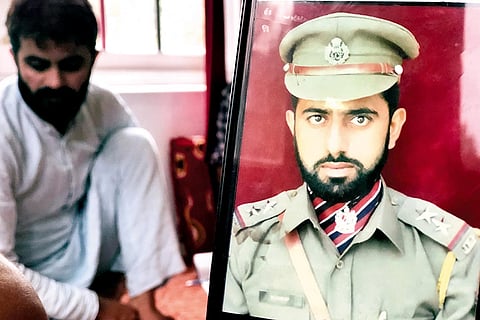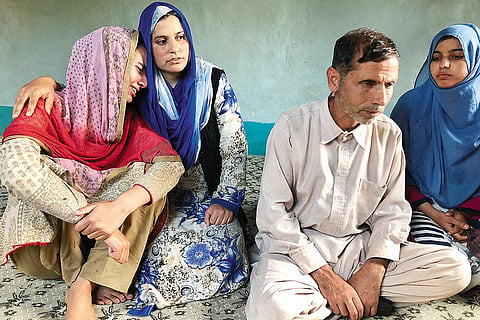It’s a first for the Jammu and Kashmir Police in three decades of battling insurgency in the Valley. Never before had militants abducted the kin of Kashmiri policemen in response to detentions and alleged harassment of the relatives of militants and ransacking or burning down of their houses by government forces. That rubicon was crossed this August, when three policemen and eight kin of policemen were abducted and the police warned by Hizbul Mujahideen’s local top gun, Riyaz Naikoo, to refrain from involving militants’ families in their efforts to quell the insurgency.
Why Families Of J&K Policemen Bear The Brunt Of Militants
For the first time, the kith and kin of policemen in J&K find themselves in the crosshairs of militants’ rage
For long, it’s been usual practice for security agencies to arrest family members of militants or detain them under preventive detention laws, deny passports to them and so on. By abducting family members of policemen, the militants have thrown a new challenge at the government’s policy and practice on how to deal with militants’ families.
In an audio message he released on August 31, a day after the abductions, Naikoo is heard saying that the policemen’s relatives were abducted so that policemen “know how a mother feels when her son is taken away”—in an apparent reference to alleged enforced disappearances and arrests of unarmed civilians associated with the history of counterinsurgency in Kashmir. The immediate trigger was the detention of Naikoo’s father Asadullah by the police and the burning down of houses belonging to families of two militants.
“Release all our relatives within three days, else your kin won’t be safe,” Naikoo warned. “We have been saying you are among our own, but your behaviour has proved otherwise. If you want to involve families in this war, we are ready for that too. Our families cannot be a hurdle in our path, but you think of your family…. You act like Hitler inside the police stations, you are involved in every second wrongdoing in society…. You should have supported us, but you fight us.”
While social media and neighbourhoods buzzed with debates over the ethics of the abductions and whether it reinforced the pitting of Kashmiri against Kashmiri in the conflict-torn region, all the abducted people were released the same evening. The militants warned they will abduct policemen’s kin again if their family members are arrested or houses ransacked or burned. “Our family members are in hundreds, but yours are in thousands,” Naikoo said in another audio message, issued after his father Asadullah, who was detained by the police, was set free.
Another first last month was the killing of policemen in their houses during Eid. In the evening of August 22, militants shot dead 35-year-old sub-inspector Mohammed Ashraf Dar at his home at Larev hamlet in Pulwama district, some 25 km to the south of Srinagar. Ashraf had just entered the house and was sitting in the kitchen with his 18-month-old daughter in his lap. He called out for his wife, Shaila Gani, and two sons. But suddenly found the muzzle of an AK-47 touching his face. He saw two gunmen.

Shaila says the gunmen had entered the house without anyone noticing it and had held her 13-year-old son Tabeen Ashraf hostage in a corridor, with a butcher knife to his throat. “I didn’t know that when I stepped into the corridor. They put a gun to my head and I couldn’t do a thing. One of them asked when my husband would return, and I said, ‘In an hour.’ But he was back in 10 minutes and had our daughter in his lap. They killed him,” she says.
Ashraf was the third policemen killed on Eid. Earlier that day, militants had shot dead 34-year-old Fayaz Ahmad, a trainee police constable, when he was returning home after offering Eid prayers in Kulgam district of south Kashmir. Special police officer Mohammed Yaqoob Shah was shot dead in Pulwama district. And the body of a BJP worker, Shabir Ahmad Bhat, was found at Litter village in the same district, a day after he had been abducted.
A senior Kashmiri police officer triggered an intense debate on social media when he tweeted: “In past couple of days five Kashmiris killed by terrorists but intellectual OGWs (Over Ground Workers) will be mum as usual because they are part and parcel of Pakistani terrorism project that aims at destroying Kashmir.” Political analyst Gowhar Geelani took a contrary view, quoting the late journalist Kuldip Nayar, who had once remarked, “What the police, government forces and the Indian Army did to Kashmiris inside the torture centres of Papa-2, Tattoo Ground, Cargo and other interrogation centres would put entire mankind to shame.”
Mainstream politicians joining the debate asked civil society to stop differentiating between ‘good’ and ‘bad’ killings. “This isn’t militancy,” says National Conference spokesperson Junaid Azim Mattu, reacting to killings of policemen. “This is savagery and barbarism, nihilism. A hundred and one things, but not militancy.” “Selective outrage” is even worse, says NC vice-president Omar Abdullah. Referring to the separatists, he says leaders vocal about alleged security force excesses are silent about the abductions by militants.
“Those who blinded a generation of Kashmir have no moral authority to talk about human rights and morals,” says Geelani. “Yes, the armed rebels too transgress and indulge in killings, which should be deplored and condemned forcefully. That said, it is neither about armed forces nor militants. These are, at best, symptoms.” The cure, he argued, lies in a political solution. The debate is an indicator of the fault-lines within Kashmiri society.
The spree of abductions began after the houses of two militants, Shah Jahan Mir of Jaish-e-Mohammed and Syed Naveed of Hizbul Mujahideen, were burned down in Shopian, around 60 km south of Srinagar, after militants killed four policemen in the same district. Families of the two militants accuse army personnel of barging into their houses at midnight and setting them on fire by throwing some powder.
These abductions blurred the distinction militants had been drawing between the J&K Police’s counterinsurgency force—the Special Operations Group (SOG)—and its other policemen. This time the militants didn’t spare families of other policemen, who say they have nothing to do with counterinsurgency operations and harassment of militants’ families by the SOG and the army .
It has been a common complaint among Kashmiri policemen that senior officers have been ensuring the whole force is seen more and more by the locals as the SOG, which has earned quite a reputation in tracking militants since 1994 and has a role in almost all counterinsurgency operations.
“They took away my son before my eyes,” says Aashia Bano, 57, whose only son, 19-year-old Raja Faizan Makroo, was abducted by militants on August 30, and released the next day, as his uncle Mushtaq Ahmad Makroo is a constable in the police. “I pleaded with them to take me instead. Now my son is back, but I cannot forget that look of his when they were taking him. This will kill me every day and night.” Now she wants to move away from her village in Kulgam.
A few days before the abductions, 790 new recruits, mostly from the Kashmir region, joined the J&K Police. At their passing out parade on August 25 at Lethpora Police Training School, where parents of the cadets were seen hugging and kissing their wards jubilantly, DGP S.P. Vaid said 1,660 policemen have been killed in the region, and that the country and the state should acknowledge their sacrifice.
While the DG says the cadets were being trained for both counterinsurgency and law-and-order duties, including how to tackle stone-pelting, the cadets were cautious about their role. A cadet says they have been trained to handling law and order and crimes, but omits counterinsurgency. “We have to keep good relations with the people and help them out in all disasters,” says Aqib Malik from Srinagar.

Tariq Malik’s kin mourn his death on August 23
Of the total 33 policemen killed this year, 10 were from Pulwama, making it one of the worst-hit districts in the Valley. Ashraf’s 62-year-old father Ghulam Qadir, who has a house adjacent to his son’s residence, says his son was like anybody else in the village. “Having never been a part of counterinsurgency operations, he had not harmed anyone and that was why he would come home and stay with his family without any security. We must know why he was killed. What was his crime?” Dar asks.
Up in apparently calmer north Kashmir, wailing relatives of 49-year-old forest guard Tariq Ahmad Malik also want to know why he was killed. Around 55 km north of Srinagar, in the Tangmarg forest, is Zandpal—a hamlet surrounded by dense alpine trees on one side, and vast wheat fields and sparse apple orchards on the other. The road to Zandpal is steep, unpaved and full of potholes. Many people from different villages have come walking all the way to mourn with the family of a “martyr”. On August 23, Tariq was killed in front of his two daughters, Ronak and Zeenat, class 12 students in a government-run school, his wife Shareefa and other relatives in the kitchen of his one-storey house.
Tariq was offering namaaz when a gunman fired at him from very close range. The police say it was the Lashkar-e-Toiba. The Lashkar says it was the police. “My uncle spent long years in jail for being with the Tehreek (Kashmir movement). Even on the day he was killed, the army was looking for him. The police say the Lashkar killed him. We want to know why the Lashkar killed him. What was his sin?” asks Tariq’s 25-year-old niece Tabasum, in a hall full of crying relatives, neighbours and friends, besides his elderly mother.
Officers at Kunzar police station describe Malik as the “victim of factionalism and internecine squabbling”. “He was one time a very active OGW, but had been silent for some time. Maybe that’s why the Lashkar killed him,” says an officer. Refuting the allegation, the Lashkar issued a long statement blaming the police and Indian agencies instead for carrying out such killings to drive a wedge between civilians and militants.
Of 130 militants killed this year in the Valley, 62 were in south Kashmir. Senior police officers argue this has caused a “fear psychosis” among the militants despite growing recruitment. The number of militants has crossed 300, for the first time in two decades. And 130 Kashmiri youths have picked up guns this year so far—up from 126 last year, they say.
“We had a peaceful Amarnath yatra and no major attack anywhere in the Valley,” says an officer. “Militants have started hitting at soft targets like common policemen to provoke the police force.” A senior officer in south Kashmir says militants are targeting policemen as their “supporters, OGWs (overground workers)and hideouts are getting exposed”, unnerving them.
Of 62 militants killed in south Kashmir, 33 died in Shopian district, known as the hotbed of Kashmir’s new militancy. The police say the militants are unable to grasp that their support base has dwindled and people no longer back them during gunbattles with the forces. “They are several groups now. They no longer belong to any outfit. They hit soft targets like policeman holidaying in villages or local politicians, and now relatives of the policemen, expecting a disproportionate reaction from the police force,” says a senior police officer.
Another officer says the police are an important part of Kashmiri society and their families and relatives would number around 16 lakh. “Nobody can afford to antagonise them,” he says. Last year, the police received 1,18,000 applications from all over J&K for 5,362 posts of constables, and 70,000 for 680 posts of sub-inspectors. The highest number of applications (5,121) were from south Kashmir’s Anantnag district, followed by Shopian with 3,419 applications.
By Naseer Ganai in Pulwama, Tangmarg and Kulgam